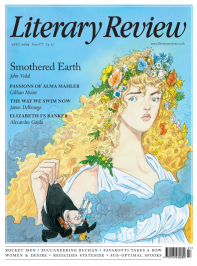Felipe Fernández-Armesto
A Polymath’s Progress
Thomas Harriot: A Life in Science
By Robyn Arianrhod
Oxford University Press 361pp £19.99
Few readers, even of Literary Review, will ever match fictional geniuses like Merlin, Mycroft or Marvel’s Iron Man. But Thomas Harriot came close. He was a humbly born Oxford scholar ‘of pregnant parts and quick, inventive brain’, who matriculated in 1577. Courtiers and aristocrats plucked him from obscurity and pensioned him, not only exploiting his brilliance but also giving him freedom to pursue his own work – an enviable gesture of confidence for those of us subject to peer review. Not that his intellectual peers were uneffusive: Nathaniel Torporley detected ‘the splendour of undoubted truth’ in his fellow mathematician. George Chapman said that his ‘depth of soul measures the height’.
Posterity, however, long failed to echo his contemporaries’ admiration, although Harriot anticipated scientific and philosophical breakthroughs usually attributed to Galileo, Leibniz, Newton, Descartes and Malthus. When he died in 1621, almost all his surviving work, rescued from the pile of ‘waste papers’ he ordered to be burned, took the form of thousands of manuscript folios of crabbed notations, often using algebraic and phonetic symbols of the author’s devising. Although one tome on algebra was published in 1631, the task of turning Harriot’s notes into intelligible text was largely beyond his executors. The only piece he published in his lifetime was unrepresentative: his Brief and True Report of the New Found Land of Virginia was a promotional pamphlet designed to attract investors and settlers to England’s first, doomed American outpost, where Harriot accompanied an abortive attempt at colonisation in 1585. Had Richard Hakluyt, the restless promoter of a vision of English empire, not encouraged its publication, and had a spectacular illustrated edition not followed in Amsterdam, scholars might have overlooked Harriot altogether, and his gifts for mathematics, physics and astronomy might have been forgotten.
Over the last few decades, however, Harriot has attracted enormous and growing attention from historians of science. In consequence, the excellent biography John Shirley brought out in 1983 already seems seriously out of date. The need for a new work that incorporates more recent scholarship and makes it

Sign Up to our newsletter
Receive free articles, highlights from the archive, news, details of prizes, and much more.@Lit_Review
Follow Literary Review on Twitter
Twitter Feed
Under its longest-serving editor, Graydon Carter, Vanity Fair was that rare thing – a New York society magazine that published serious journalism.
@PeterPeteryork looks at what Carter got right.
Peter York - Deluxe Editions
Peter York: Deluxe Editions - When the Going Was Good: An Editor’s Adventures During the Last Golden Age of Magazines by Graydon Carter
literaryreview.co.uk
Henry James returned to America in 1904 with three objectives: to see his brother William, to deliver a series of lectures on Balzac, and to gather material for a pair of books about modern America.
Peter Rose follows James out west.
Peter Rose - The Restless Analyst
Peter Rose: The Restless Analyst - Henry James Comes Home: Rediscovering America in the Gilded Age by Peter Brooks...
literaryreview.co.uk
Vladimir Putin served his apprenticeship in the KGB toward the end of the Cold War, a period during which Western societies were infiltrated by so-called 'illegals'.
Piers Brendon examines how the culture of Soviet spycraft shaped his thinking.
Piers Brendon - Tinker, Tailor, Sleeper, Troll
Piers Brendon: Tinker, Tailor, Sleeper, Troll - The Illegals: Russia’s Most Audacious Spies and the Plot to Infiltrate the West by Shaun Walker
literaryreview.co.uk